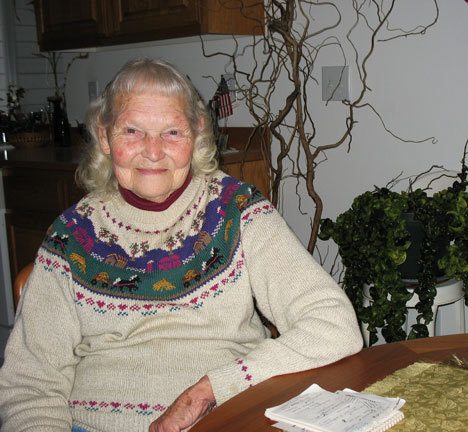Thanks to some alert bank tellers, Neta Lea barely avoided becoming a victim of a couple of scam artists from Canada last week.
“They were very convincing, and I got taken in hook, line and sinker,” Lea, 81, said Monday.
At about 10 a.m. Friday morning, Lea got a phone call from a man saying he was a public defender in Montreal, Canada. Lea’s grandson was in trouble, he said.
“He said there was an accident and my grandson had been picked up and found to have been drinking,” Lea recalled. “The man, who gave his name as Renee Fournier, told me my grandson was driving. He didn’t identify him by his name.”
Lea panicked and asked to talk to her grandson, who had not yet been named by Fournier.
“When Nathan got on the line, I scolded him by name. He was very contrite and humble, kept calling me ‘grandma.’ But he sounded odd and when I asked, he explained he had a bad cold.”
When the “public defender” got back on, he said that, because no one was injured in the car accident, it would be possible for Lea to pay the court charges and processing fee. Her grandson would be released and his record expunged.
To speed the process, Fournier told Lea to go to a nearby Walmart and get a MoneyGram for $3,000 and send it to his office. He would call back and get the tracking number, so Nathan could be released as soon as possible.
This was the first time Fournier identified Nathan by name.
“If anyone asked, I was to say I was getting money for a loan to a family member in need,” Lea said. “I told him I’d go straight to the bank and take care of it.”
She fully admits now she was gullible, but an event earlier this year put her in the right mindset for a scam to succeed.
Her grandson, a student at Central Washington University in Ellensburg, had car trouble in the spring and called Lea for some money to repair his car. So when the phony Fournier called, Lea was ripe for the plucking and open to the idea that this was the real deal.
Lea was afraid for her grandson and set out to do Fournier’s bidding.
She went to US Bank in Freeland to withdraw $3,000 cash for the MoneyGram.
“Because I asked for an immediate cash withdrawal, one of the managers came over — her name was Dee — and asked me what the money was for,” Lea said. “When I told her, she said it might be a scam.”
The bank manager suggested calling her grandson.
“I found his cell-phone number and we called from Dee’s desk,” Lea said.
Nathan was OK, safe and sound with friends in Quilcene on the Olympic Peninsula.
That afternoon, Fournier called again to ask if Lea had sent the money.
“I told him the bank had a policy not to release money for 24 hours and it would be Saturday before I could send it,” she replied.
On her way home, she stopped by the Island County Sheriff’s Office in Freeland, but was told by a deputy that, since the problem was out of its jurisdiction, there was nothing he could do.
Lea contacted several mainland television stations, the state attorney general, Walmart and the Record to warn others about the flim- flam, known to law enforcement agencies nationwide as the “granny scam.”
“Normally, I’m pretty intelligent and not trusting with strange phone calls like that, but these guys were good and I bought into their scam,” Lea said. “People like me need to know about this and be warned. I talked to another woman on the island who had something similar happen to her.”
Fournier had provided a call-back number. Not surprisingly, when called by the Record, it was disconnected.
The Washington state Attorney General’s office has advice for folks getting strange calls such as the one Lea received:
- Don’t fill in the blanks. If the caller says, “It’s your grandson,” respond with “Which one?” Most likely, the perpetrator will hang up.
- Verify the caller. Always confirm your grandchild’s identity by saying you will return the call at his or her home or on his cell phone (but don’t ask the caller for it). If you don’t have your grandchildren’s phone numbers, contact a trusted family member for them.
- Be mum on account numbers. Never provide your bank or credit-card account numbers to any caller, even someone claiming to be from your bank—regardless of the reason.
- Be suspicious of requests for money wires.
- Report it. If your “grandchild” calls requesting money, go to the Attorney General’s Web site at www.atg.wa.gov, or call 360-753-6200.



